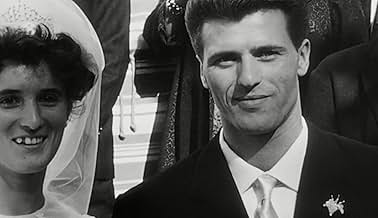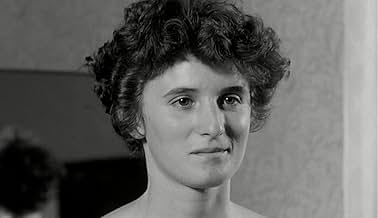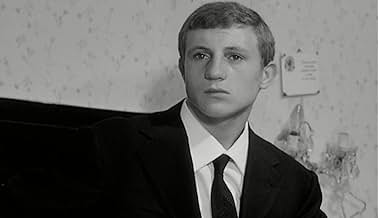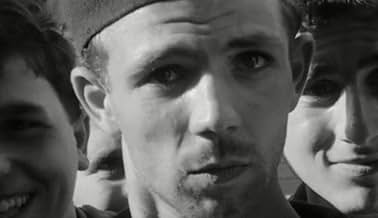PUNTUACIÓN EN IMDb
7,5/10
2,7 mil
TU PUNTUACIÓN
Añade un argumento en tu idiomaDirector Pasolini traverses Italy in 1963 with camera and microphone interviewing people in public places about sex, marriage and gender roles.Director Pasolini traverses Italy in 1963 with camera and microphone interviewing people in public places about sex, marriage and gender roles.Director Pasolini traverses Italy in 1963 with camera and microphone interviewing people in public places about sex, marriage and gender roles.
Io Appolloni
- Self - Girl at Lido with Swimming Cap
- (sin acreditar)
Graziella Chiarcossi
- Graziella the Bride
- (sin acreditar)
Graziella Granata
- Self - Girl at Lido with Long Hair
- (sin acreditar)
Pier Paolo Pasolini
- Self - Interviewer
- (sin acreditar)
Argumento
¿Sabías que...?
- ConexionesEdited into Lo schermo a tre punte (1995)
Reseña destacada
Pier Paolo Pasolini always has a streak of the documentary filmmaker somewhere in his body of work, where he usually went for expressing his poetic viewpoint on the lower classes (i.e. Mamma Roma) and, later on, the dark fables and tawdry tales of Oedipus Rex and Arabian Nights. If Love Meetings, his only straight documentary feature, isn't completely impressive it may be because in the little moments when he tries for something poetic, oddly enough, like in the numbered transitions, it doesn't really work as well. Those little bits come off as dated 60s stuff. On the contrary though when Pasolini simply takes to the street with a 16mm and a microphone and asks people directly about sex and women's roles and homosexuality and fidelity and freedoms related to all of the above then it gets really interesting. In fact, for a movie relegated to Italian cities and countrysides, with sound-bytes from across the spectrum from college kids to professors (and author Alberto Moravia early on) to farmers in the fields, and done so on the fly and in classic cinema verite style, it doesn't usually feel very old fashioned.
Much of what's discussed and dug up by Pasolini (who reveals himself wonderfully here as a solid journalist, something I would have liked to have seen more of in his career after seeing this) can be relatable for today's youth, if only as a cohesive set of opinions and viewpoints and occasional factoids on standards set between men and women and privacy and liberation and so on. To be sure some of it is stuck in its time and place (practically all of the children asked "Where do babies come from?" say the stork, or something involving God or other). But a lot of it is so absorbing because of the generous flow of ideas- it's a wonderfully edited piece, as sometimes crudely constructed as it is, which is part of the point as a true independent production- and Pasolini's determination to get as much as he can at the heart or whatever at sexual relations and societal norms and what's changed over time in Italy and if there can be any more change in the future. It's probably the most obvious example from the director to screen in a sociology class. 8.5/10
Much of what's discussed and dug up by Pasolini (who reveals himself wonderfully here as a solid journalist, something I would have liked to have seen more of in his career after seeing this) can be relatable for today's youth, if only as a cohesive set of opinions and viewpoints and occasional factoids on standards set between men and women and privacy and liberation and so on. To be sure some of it is stuck in its time and place (practically all of the children asked "Where do babies come from?" say the stork, or something involving God or other). But a lot of it is so absorbing because of the generous flow of ideas- it's a wonderfully edited piece, as sometimes crudely constructed as it is, which is part of the point as a true independent production- and Pasolini's determination to get as much as he can at the heart or whatever at sexual relations and societal norms and what's changed over time in Italy and if there can be any more change in the future. It's probably the most obvious example from the director to screen in a sociology class. 8.5/10
- Quinoa1984
- 30 nov 2008
- Enlace permanente
Selecciones populares
Inicia sesión para calificar y añadir a tu lista para recibir recomendaciones personalizadas
- How long is Love Meetings?Con tecnología de Alexa
Detalles
Taquilla
- Recaudación en todo el mundo
- 2789 US$
- Duración1 hora 32 minutos
- Color
- Mezcla de sonido
- Relación de aspecto
- 1.85 : 1
Contribuir a esta página
Sugerir un cambio o añadir el contenido que falta

Principal laguna de datos
By what name was Encuesta sobre el amor (1964) officially released in India in English?
Responde



























